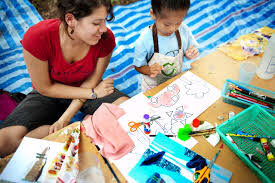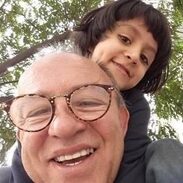 In our community they are usually referred to as ¨neglected¨ or ¨invisible¨ African elders, aging African refugees and immigrants who have resettled in the USA, many of whom are the survivors of the trauma of war. While working at the Center for Victims of Torture, I was assigned to a project named, New Neighbors Hidden Scars (NNHS), the purpose of which is to assist torture and war trauma survivors by promoting their overall health, working to restore and strengthen their leadership capabilities, and to create networks of support that are responsive to their unique needs. Through this process, we have been able to study and disseminate successful models of community-based care. Working with this program has helped to provide me with the confidence and determination to pursue advanced study in Social Work.
In our community they are usually referred to as ¨neglected¨ or ¨invisible¨ African elders, aging African refugees and immigrants who have resettled in the USA, many of whom are the survivors of the trauma of war. While working at the Center for Victims of Torture, I was assigned to a project named, New Neighbors Hidden Scars (NNHS), the purpose of which is to assist torture and war trauma survivors by promoting their overall health, working to restore and strengthen their leadership capabilities, and to create networks of support that are responsive to their unique needs. Through this process, we have been able to study and disseminate successful models of community-based care. Working with this program has helped to provide me with the confidence and determination to pursue advanced study in Social Work.
When I conducted a needs assessment for the NNHS, I was struck by the numerous barriers faced by immigrant African seniors with respect to accessing services. My efforts led to the design of a model for under-resourced areas with especially high numbers of African immigrants. In these strategic areas, it has been an enormous struggle to meet the mental health needs of the rapid influxes of refugees. Over time, however, we were able to develop multidisciplinary networks of providers to improve the coordination of care for trauma survivors. What we found to be particularly effective was the development of immigrant-led support groups in housing complexes and churches, including treatment groups for refugee students, and the development of an XXXX Food Distribution Center (AFDC), providing health and social service information along with culturally appropriate food assistance. I currently have the privilege of volunteering my service as the Executive Director of the XXXX.
African seniors have immigrated to the US under vastly different circumstances; some have been brought here by their children, others were forced out of their countries due to political violence, some came as young adults. Most, however, experience acute adjustment stressors. As part of my doctoral studies, I hope to explore how migration trauma affects the wellbeing of African seniors, especially in the area of cultural bereavement and adjustment to a new society. A related direction for my research would involve the development of new analytical models for working with African senior communities in the context of existing aging programs. These new models would be designed in accordance with the culturally relevant perspectives of many African communities and apply a holistic approach to recovery strategies for post-traumatic-stress disorder (PTSD) as well as more general forms of trauma. It is hoped that this research would fill a gap in the literature since there are virtually no African-specific models in the literature on aging and there is an enormous need for additional theoretical studies concerning the implementation of aging programs in immigrant African communities. It is also hoped that this research would contribute to the development of culturally appropriate, empirically validated interventions that could serve to reduce the adverse consequences of war trauma, PTSD, and resettlement shock, thereby improving the well being of seniors who have immigrated from Africa.
The needs assessment that I have conducted suggests that a large percentage of African seniors are struggling with mental health symptoms related to war and PTSD, often combined with other mental health issues related to aging, especially Alzheimer’s and Dementia. Furthermore, these mental health conditions are typically exacerbated by environmental factors such as isolation, language barriers, unemployment, poverty, dependence on children, the loss of status and lack of transportation. In broader terms, I am very much interested in researching the entire gambit of issues involving the mental health of immigrants, especially seniors, and Africans in particular. I hope to publish in the future concerning the development of empirically validated interventions that reduce the adverse consequences of resettlement stressors, especially as combined with mental health issues—particularly, torture, forced migration, and PTSD. I am concerned with the paucity of existing research not only concerning African refugees in particular, but immigrant senior populations in general. Thus, I also hope to make important contributions to the systematic study of migration trauma, generally speaking, and the hurdles that must often be overcome in the accessing of services upon resettlement.
It is my intention to design studies in which African refugees and other immigrants are given the opportunity to make meaningful contributions to the design and implementation, as well as the evaluation, of the research project. This supports the University of Michigan’s mission of promoting social justice through the empowerment of the weakest and most vulnerable members of our society; and in this way I also hope to contribute to the amelioration of oppressive conditions to which they are subject. One especially salient variable in my research will be the way in which ethnographic differences between African immigrant communities are characterized by specific words or terms used to refer to specific illnesses or mental health challenges This is especially important given the vast need for culturally specific treatment models for dealing with culturally specific practices, metaphors, spiritualities, etc., thereby leading to more accurate understandings of the specific mental health and wellness challenges faced by immigrant seniors. I see this type of research is of critical importance for the development of new training models, therapeutic initiatives, and even pharmacological investigations that would be of benefit to the broader body of social work research concerned with immigrant seniors.
Growing up in Kenya, we followed a family tradition of children being sent to live with their grandparents between the ages of 7 and 11. My parents lived in a city while my grandparents lived in the rural area. Thus, my siblings and I were sent to my grandparents to be educated in the ways of the community: culture, norms, values, customs, rituals, folklore, etc. Each story we were told had a moral lesson illustrating a societal norm. We greatly respected my grandparents, and by extension the elderly in the community for the wisdom they embodied. When the need for conflict resolution arose, we were told to take it to the “Jorieko” meaning, ¨the wise ones.¨ I date my interest in the elderly to this period, and I have been fascinated by seniors ever since. My grandmother did not like going to the city because it represented a loss of authority for her, feeling much more at home with the practice of rural customs and lifestyles. And I have often pondered my grandmother’s sentiments when reflecting upon how still very much more traumatic it would be to be forced out of one’s country and culture entirely, for political reasons.
My central career objective is to spend the balance of my professional life developing culturally sensitive mental health delivery models for African immigrants and refugees, especially older residents, always linking research to practice. I hope to serve as a teacher, consultant, researcher, and clinician in my area of expertise. Your doctoral program will help me to become a well rounded intellectual and scholar concerning the mental health and public policy issues faced by or affecting our senior populations, especially first-generation immigrants. Since I am myself an immigrant from Africa to the US, and now embarking on middle age at 44, I feel uniquely qualified for the development of a research interest in this area since I have a well refined capacity to empathize with the stresses that immigrant families and individuals from Africa must bear, the difficulties of cultural adjustment, migration trauma, etc. I look forward to shouldering increasing professional responsibility in my work with African immigrants and refugees, institutions of higher learning, and social work professionals: conducting research and designing culturally appropriate, integrative mental health service models. It is painfully clear to me that social service agencies lack the necessary expertise in the development and implementation of culturally specific and appropriate mental health services for immigrants and refugees from Africa, as well as other regions of the world, and I ask for the opportunity and profound privilege of devoting my life to this cause.
I am also interested in the opportunity afforded by your program to attain a dual degree in social work and psychology, since I am concerned with the mental health issues of immigrant populations and this would help to refine my capacity to perform creative, cutting-edge research in this area. As a social worker, I am interested in promoting greater levels of social inclusion for immigrants from Africa and the study of psychology would help me to understand the mental health aspects of that inclusion. I am particularly excited about the possibility of studying under Professor XXXX whose research interest is in the area of clinical gerontology and racial and ethnic variations of service delivery to the elderly. I thank you for considering my application to your program.
 I am a young woman from Bangkok, Thailand that profoundly adores studying the Communication Arts and very much wants to become a teacher. I want to make XXXX University my new home for several years and complete my MA Degree in Teaching and Learning. I am convinced that your program is the ideal program for learning how I can become the very finest teacher possible so that I can return to Thailand and make major contributions to education in my country.
I am a young woman from Bangkok, Thailand that profoundly adores studying the Communication Arts and very much wants to become a teacher. I want to make XXXX University my new home for several years and complete my MA Degree in Teaching and Learning. I am convinced that your program is the ideal program for learning how I can become the very finest teacher possible so that I can return to Thailand and make major contributions to education in my country.






 As a 34-year old woman from Iran, I believe that my life experience and pronounced ability to overcome hardships make an excellent candidate for the doctoral program in Clinical Psychology at XXXX. I am extremely determined to contribute to constructive change in people’s lives. I am very highly motivated to succeed in your program because this will enable me to fulfill my calling, my duty to help abused women, like myself, that have been victimized by brutal forms of Islamic patriarchy. XXXX’s emphasis on producing and applying scientific knowledge to the assessment, understanding, and amelioration of human problems and its commitment to excellence in scientific training, using clinical science as the foundation for designing, implementing, and evaluating assessment and intervention procedures, will give me the tools that I need to establish an effective practice as a licensed clinical psychologist.
As a 34-year old woman from Iran, I believe that my life experience and pronounced ability to overcome hardships make an excellent candidate for the doctoral program in Clinical Psychology at XXXX. I am extremely determined to contribute to constructive change in people’s lives. I am very highly motivated to succeed in your program because this will enable me to fulfill my calling, my duty to help abused women, like myself, that have been victimized by brutal forms of Islamic patriarchy. XXXX’s emphasis on producing and applying scientific knowledge to the assessment, understanding, and amelioration of human problems and its commitment to excellence in scientific training, using clinical science as the foundation for designing, implementing, and evaluating assessment and intervention procedures, will give me the tools that I need to establish an effective practice as a licensed clinical psychologist. As a psychology professional, I wish to specialize in both the short and long terms in the area of community mental health. I look forward to a long and highly productive career helping a wide range of individuals in my community to realize their fullest potential, finding happiness in life through the development of healthy relationships with both family and society.
As a psychology professional, I wish to specialize in both the short and long terms in the area of community mental health. I look forward to a long and highly productive career helping a wide range of individuals in my community to realize their fullest potential, finding happiness in life through the development of healthy relationships with both family and society.